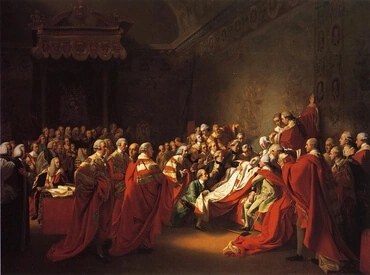1
And at that◦ time shall Michael stand, the great prince who stands for▵ the sons of thy people; and there shall be a time of adversity, which was not since there was a nation even··to that◦ same time; and at that◦ time thy people shall escape, every one who shall be··found written in the book.
2
And many of them sleeping in the ground of dust shall awake, these to eternal life, the rest* to reproach and eternal abhorrence◦.
3
And the intelligent shall shine◦ as the shining◦ of the expanse, and those who turn many to be··just, as the stars for eternity and forever.
4
But thou◦, O Daniel, block··off the words, and seal the book, even··to the time of the end; many shall run··around, and knowledge shall be multiplied.
5
And I◦, Daniel, saw, and, behold, there stood two others, one here◦ on the lip of the river◦ and one there◦ on the lip of the river◦.
6
And one said to the man◦ clothed in linen, who was on the waters of the river◦, How▵ long shall it be to the end of these wonders?
7
And I heard the man◦ clothed with linen, who was above the waters of the river◦, and he lifted··up◦ his right hand and his left hand to▵ the heavens, and promised by Him who lives for eternity that it shall be for a season of seasons and a half; and when they have completed scattering the hand of the holy people, all these things shall be completed.
8
And I◦ heard, but I understood not; and said I, O my Lord, what shall be the last of these things?
9
And He said, Go, Daniel; for the words are blocked··off and sealed until the time of the end.
10
Many shall be purified, and made··white, and examined; but the wicked shall act··wickedly, and all the wicked shall not understand; but the intelligent shall understand.
11
And from the time that the continual offering shall be removed, and to the giving of the detestable that makes··desolate, shall be a thousand two··hundred and ninety days.
12
Happy is he who tarries, and reaches to the thousand three hundred and five and thirty days.
13
But go thou◦ even to the end; and thou shalt rest, and stand in thy lot at the end of the days.







